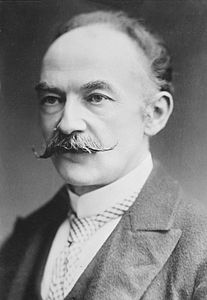A King's Soliloquy [On the Night of His Funeral]
Thomas Hardy 1840 (Stinsford) – 1928 (Dorchester, Dorset)
From the slow march and muffled drum,
And crowds distrest,
And book and bell, at length I have come
To my full rest.
A ten years' rule beneath the sun
Is wound up here,
And what I have done, what left undone,
Figures out clear.
Yet in the estimate of such
It grieves me more
That I by some was loved so much
Than that I bore,
From others, judgment of that hue
Which over-hope
Breeds from a theoretic view
Of regal scope.
For kingly opportunities
Right many have sighed;
How best to bear its devilries
Those learn who have tried!
I have eaten the fat and drunk the sweet,
Lived the life out
From the first greeting glad drum-beat
To the last shout.
What pleasure earth affords to kings
I have enjoyed
Through its long vivid pulse-stirrings
Even till it cloyed.
What days of strain, what nights of stress
Can cark a throne,
Even one maintained in peacefulness,
I too have known.
And so, I think, could I step back
To life again,
I should prefer the average track
Of average men,
Since, as with them, what kingship would
It cannot do,
Nor to first thoughts however good
Hold itself true.
Something binds hard the royal hand,
As all that be,
And it is That has shaped, has planned
My acts and me.
Font size:
Submitted on May 13, 2011
Modified on March 05, 2023
- 1:07 min read
- 111 Views
Quick analysis:
| Scheme | ABAB CXCX DEDE FGFG HBHB BBBB IBIB XJXJ KLKL BBBF BMBM |
|---|---|
| Closest metre | Iambic trimeter |
| Characters | 1,157 |
| Words | 226 |
| Stanzas | 11 |
| Stanza Lengths | 4, 4, 4, 4, 4, 4, 4, 4, 4, 4, 4 |
Translation
Find a translation for this poem in other languages:
Select another language:
- - Select -
- 简体中文 (Chinese - Simplified)
- 繁體中文 (Chinese - Traditional)
- Español (Spanish)
- Esperanto (Esperanto)
- 日本語 (Japanese)
- Português (Portuguese)
- Deutsch (German)
- العربية (Arabic)
- Français (French)
- Русский (Russian)
- ಕನ್ನಡ (Kannada)
- 한국어 (Korean)
- עברית (Hebrew)
- Gaeilge (Irish)
- Українська (Ukrainian)
- اردو (Urdu)
- Magyar (Hungarian)
- मानक हिन्दी (Hindi)
- Indonesia (Indonesian)
- Italiano (Italian)
- தமிழ் (Tamil)
- Türkçe (Turkish)
- తెలుగు (Telugu)
- ภาษาไทย (Thai)
- Tiếng Việt (Vietnamese)
- Čeština (Czech)
- Polski (Polish)
- Bahasa Indonesia (Indonesian)
- Românește (Romanian)
- Nederlands (Dutch)
- Ελληνικά (Greek)
- Latinum (Latin)
- Svenska (Swedish)
- Dansk (Danish)
- Suomi (Finnish)
- فارسی (Persian)
- ייִדיש (Yiddish)
- հայերեն (Armenian)
- Norsk (Norwegian)
- English (English)
Citation
Use the citation below to add this poem to your bibliography:
Style:MLAChicagoAPA
"A King's Soliloquy [On the Night of His Funeral]" Poetry.com. STANDS4 LLC, 2024. Web. 24 Apr. 2024. <https://www.poetry.com/poem/36306/a-king's-soliloquy-[on-the-night-of-his-funeral]>.



Discuss the poem A King's Soliloquy [On the Night of His Funeral] with the community...
Report Comment
We're doing our best to make sure our content is useful, accurate and safe.
If by any chance you spot an inappropriate comment while navigating through our website please use this form to let us know, and we'll take care of it shortly.
Attachment
You need to be logged in to favorite.
Log In